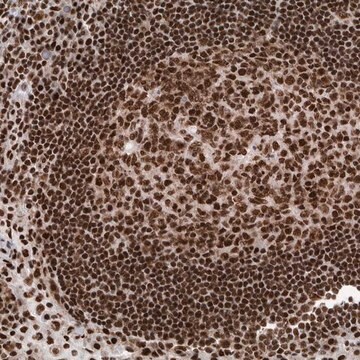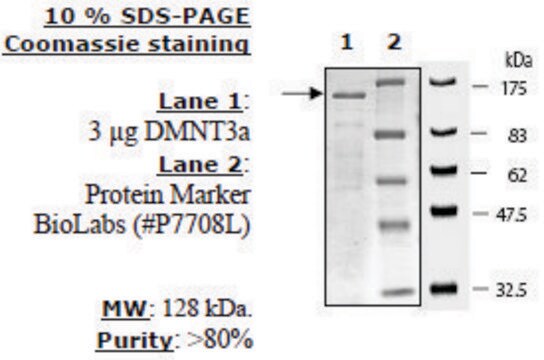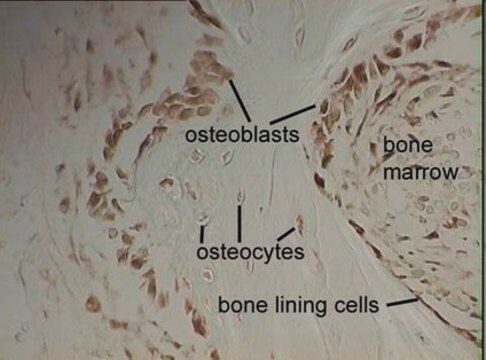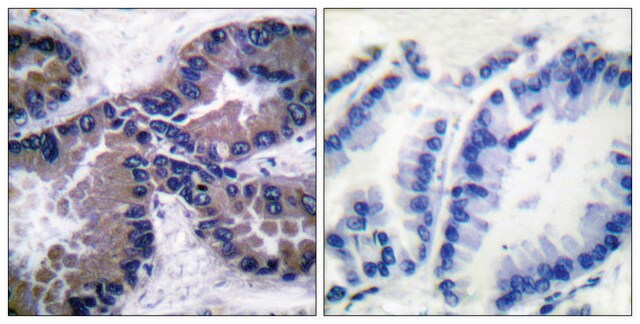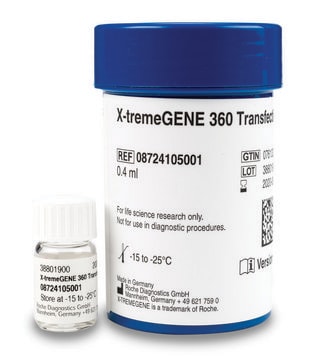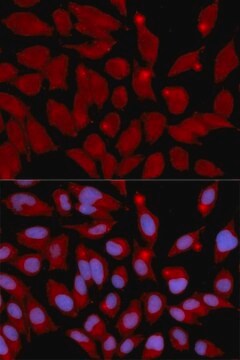SRP0396
DNMT3A/DNMT3L active human
recombinant, expressed in baculovirus infected Sf9 cells, ≥90% (SDS-PAGE)
Faça loginpara ver os preços organizacionais e de contrato
About This Item
Código UNSPSC:
12352200
NACRES:
NA.32
Produtos recomendados
fonte biológica
human
recombinante
expressed in baculovirus infected Sf9 cells
Ensaio
≥90% (SDS-PAGE)
forma
aqueous solution
peso molecular
34 kDa (MLL1)
52 kDa (DNMT3L)
embalagem
pkg of 10 μg
nº de adesão NCBI
nº de adesão UniProt
Condições de expedição
dry ice
temperatura de armazenamento
−70°C
Informações sobre genes
human ... DNMT3A(1788) , DNMT3L(29947)
Descrição geral
The DNMT3A (DNA (cytosine-5)-methyltransferase 3A) gene is mapped to human chromosome 2p23. The encoded protein has 2 isoforms, DNMT3A1 and DNMT3A2. DNMT3A1 is widely expressed and DNMT3A2 is mainly present in embryonic stem cells (ovaries and testes).
DNMT3L (DNA (cytosine-5)-methyltransferase 3-like) belongs to the Dnmt3 family. It is unable to methylate DNA. The protein has a cysteine-rich region containing a novel-type zinc finger domain. The gene is mapped to human chromosome 21q22.3.
DNMT3L (DNA (cytosine-5)-methyltransferase 3-like) belongs to the Dnmt3 family. It is unable to methylate DNA. The protein has a cysteine-rich region containing a novel-type zinc finger domain. The gene is mapped to human chromosome 21q22.3.
Aplicação
DNMT3A/DNMT3L active human has been used in in vitro methylation assay and REMSA (RNA electrophoretic mobility shift assay) to study role of ecRNAs (extra coding RNAs) in DNA methylation.
Ações bioquímicas/fisiológicas
DNMT3A (DNA (cytosine-5)-methyltransferase 3A) is a DNA methyltransferase. It is responsible for the methylation of the cytosine residue in 5′-C-phosphate-G-3′ (CpG) dinucleotides. DNMT3A plays a significant role in immunoregulation (adaptive as well as innate immune responses). It is also the most commonly mutated gene in hematologic malignancies. DNMT3A is a commonly mutated gene in acute myeloid leukemia and is responsible for an unfavorable prognosis.
DNMT3L (DNA (cytosine-5)-methyltransferase 3-like) is mainly responsible for the stimulation of DNA methylation. It is a non-catalytic accessory factor. It helps the DNA methylation machinery to be placed on properly chromatinized DNA regions. It also helps the poorly methylated area, thereby providing uniform methylation patterns. Mutations in the DNMT3L gene might be associated with azoospermia susceptibility.
DNMT3L (DNA (cytosine-5)-methyltransferase 3-like) is mainly responsible for the stimulation of DNA methylation. It is a non-catalytic accessory factor. It helps the DNA methylation machinery to be placed on properly chromatinized DNA regions. It also helps the poorly methylated area, thereby providing uniform methylation patterns. Mutations in the DNMT3L gene might be associated with azoospermia susceptibility.
Código de classe de armazenamento
10 - Combustible liquids
Classe de risco de água (WGK)
WGK 1
Ponto de fulgor (°F)
Not applicable
Ponto de fulgor (°C)
Not applicable
Certificados de análise (COA)
Busque Certificados de análise (COA) digitando o Número do Lote do produto. Os números de lote e remessa podem ser encontrados no rótulo de um produto após a palavra “Lot” ou “Batch”.
Já possui este produto?
Encontre a documentação dos produtos que você adquiriu recentemente na biblioteca de documentos.
DNMT3A Haploinsufficiency Transforms FLT3ITD Myeloproliferative Disease into a Rapid, Spontaneous, and Fully Penetrant Acute Myeloid Leukemia.
Meyer SE
Cancer Discovery, 6, 501-501 (2016)
DNMT3A Loss Drives Enhancer Hypomethylation in FLT3-ITD-Associated Leukemias.
Yang L, et al.
Cancer Cell, 29, 922-922 (2016)
The CpG island encompassing the promoter and first exon of human DNMT3L gene is a PcG/TrX response element (PRE).
Basu A, et al.
PLoS ONE, 9, e93561-e93561 (2014)
Association between single-nucleotide polymorphisms of DNMT3L and infertility with azoospermia in Chinese men.
Huang JX, et al.
Reproductive Biomedicine Online, 24, 66-66 (2012)
Isolation and initial characterization of a novel zinc finger gene, DNMT3L, on 21q22.3, related to the cytosine-5-methyltransferase 3 gene family.
Aapola U, et al.
Genomics, 65, 293-293 (2000)
Nossa equipe de cientistas tem experiência em todas as áreas de pesquisa, incluindo Life Sciences, ciência de materiais, síntese química, cromatografia, química analítica e muitas outras.
Entre em contato com a assistência técnica